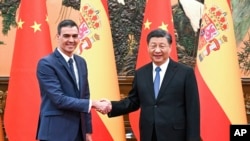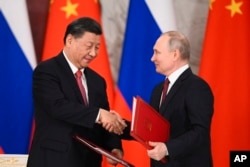Spain will be looking to leverage its 50-year-old relationship with China to bring a peaceful resolution to Russia’s war on Ukraine when it assumes the rotating presidency of the European Union next month.
The presidency will give Madrid a prominent role representing the West in efforts to put an end to the conflict on terms that do not reward Russia’s aggression.
In the run-up to taking the baton to represent the EU, Spain is throwing its weight behind Kyiv’s appeal for admission to the NATO alliance.
Ukraine must be given a strong message of support regarding its NATO membership bid, Spanish Foreign Minister José Manuel Albares said Thursday at a meeting of the military alliance in Norway, Reuters reported.
During a meeting in Beijing in March, Spanish Prime Minister Pedro Sánchez urged Chinese President Xi Jinping to discuss his nation’s peace plans with Kyiv directly.
Sánchez was the first Western leader to meet Xi after the Chinese leader traveled to Moscow earlier in March for talks with Russian President Vladimir Putin.
The Spanish premier was also keen to let the Chinese communist leader know that he believes no peace agreement should be imposed on Ukraine without its consent.
Analysts said the Beijing summit, timed to celebrate a half-century of diplomatic ties between the two countries, took on added significance because of Madrid’s looming position representing the broader Europe Union.
Observers said Spain will play a key role in the months ahead seeking to forge a united European approach to the war and how best to defend Ukraine.
Mario Esteban, senior investigator on Asia and the Pacific at the Real Elcano Institute, a think-tank in Madrid, said apart from its involvement in any peace talks over Ukraine, Spain will also have to build consensus within Europe over how to deal with China, which is an official ally of Russia.
“Spain is less hard-line towards Russia. It is not like Poland or other countries. Therefore, there is not the same level of political tension between Spain and China over Ukraine,” he told VOA.
“It is also less economically dependent on China [than] Germany or France, therefore it is freer to negotiate. This gives Spain more ability to build diplomatic consensus within the European Union towards China on questions like the war in Ukraine.”
Esteban, who has spent five years of his career in China, said relations between Beijing and Madrid are “good” despite the ambitions of the current Spanish government to attain economic independence from China in sectors like pharmaceuticals.
The leadership of both countries are hardly strangers.
Esteban said Sánchez met Xi at a G-20 conference in Bali in November and Albares spoke to his Chinese counterpart, Qin Gang, in New Delhi in March.
The two countries’ relationship has gone through a cooling off in recent years, said Esteban.
Spanish exports to China almost doubled to reach $6.6 billion between 2011 and 2018 when Xi visited Madrid.
However, for Spain, Chinese investment is not as attractive as it was in the wake of the 2008 financial crisis, said Esteban in a recent analysis of their diplomatic and economic ties.
Beijing has found other European countries, like Greece and Hungary, which are closer to the Chinese position on disputes over the South China Sea and human rights in China.
Sánchez refused to sign a memorandum of understanding on Beijing’s Belt and Road Initiative during Xi’s 2018 visit to Spain.
Esteban believes this started a more “nuanced and selective” approach by Spain to ties with China.
“All this has ushered in an era in which Spanish-Chinese relations will be increasingly influenced by geopolitical considerations and third parties, primarily the EU and the U.S.,” he wrote.
Ruth Ferrero -Turrion, an expert in European relations at Complutense University in Madrid, said China is trying to act as a global mediator in the Russian war on Ukraine.
“Spain will not make substantive changes (to its foreign policy regarding China). Traditionally, it has followed the majority view of the European Union,” she told VOA.








